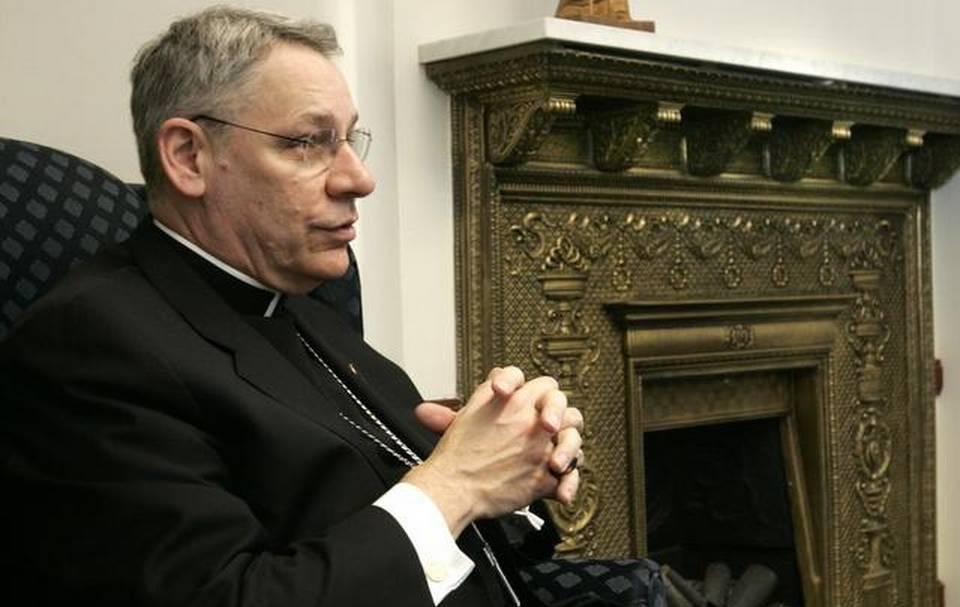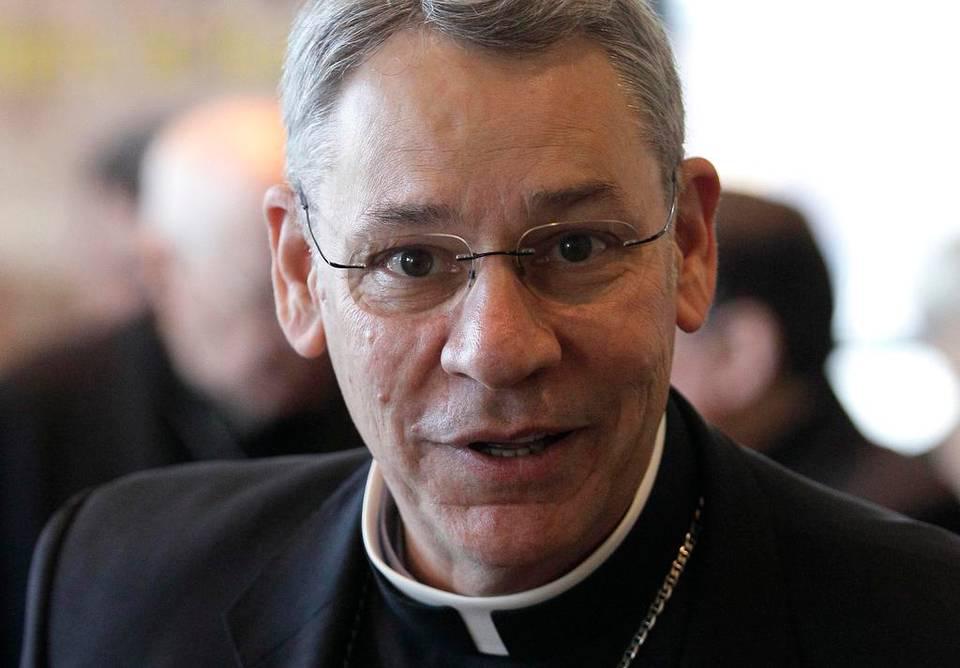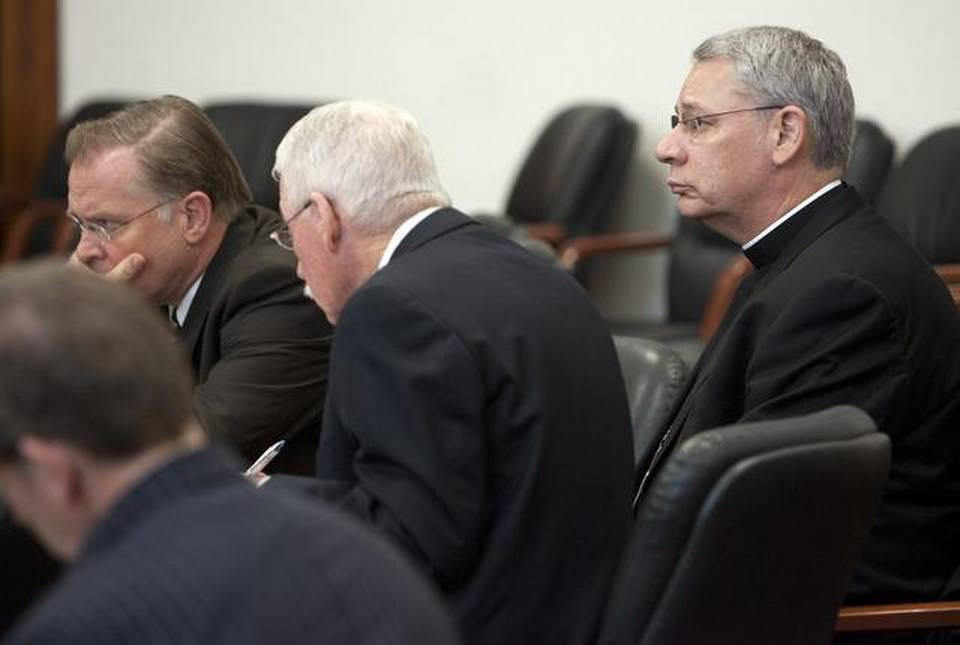|
Pope OKs resignation of Bishop Robert Finn for not reporting abuse
By Judy L. Thomas And Mark Morris
Bishop Robert W. Finn, whose nearly 10-year tenure as leader of the Roman Catholic Diocese of Kansas City-St. Joseph was marred by child sex abuse scandals, has stepped down. Pope Francis accepted Finn’s resignation Tuesday, about a week after Finn made a short visit to Rome. Finn offered his resignation under the code of canon law that allows bishops to resign early for illness or some “grave” reason that makes them unfit for office, the Vatican announced. The Vatican did not release a reason, if any, cited by Finn. Finn is 62, some 13 years shy of the normal retirement age of 75. “It has been an honor and joy for me to serve here among so many good people of faith,” Finn said in a statement released Tuesday by the diocese. “Please begin already to pray for whomever God may call to be the next bishop of Kansas City-St. Joseph.” Kansas City in Kansas Archbishop Joseph F. Naumann will serve as apostolic administrator of the Missouri diocese until a new bishop is appointed, according to an announcement by the Kansas City-St. Joseph diocese. Naumann, who was scheduled to spend Tuesday with staff at the Kansas City diocesan offices, will retain his Kansas duties. He released a letter Tuesday in which he talked of a desire for this period between bishops to be a “time of grace and healing.” “This will not be a time for innovation or change, but a time to sustain the ordinary and essential activities of the Church and where possible to advance the initiatives that already are under way,” the statement said. “I pray that your new bishop, when he arrives, will find a community united both in their love for Jesus and His Bride — the Church — as well as eager to proclaim the truth and beauty of His Gospel to the world.” In September 2012, Finn became the highest-ranking U.S. Catholic clergyman convicted of a crime related to the church’s decades-old child sexual abuse scandal. A Jackson County circuit judge convicted him of failing to report suspected child abuse, a misdemeanor, after church employees and leaders learned of child pornography on a priest’s computer. Finn received two years of probation with the agreement that the charges would be expunged from his record if he completed probation without incident. The priest, Shawn Ratigan, pleaded guilty to producing child pornography. He is serving a 50-year prison sentence and has been expelled from the priesthood. Finn’s handling of the Ratigan case prompted persistent calls for his resignation, including through billboards, a social media effort, an online petition and a letter-writing campaign to church leaders — even Pope Francis. Finn had defenders as well, perhaps none more vocal than the Catholic League’s Bill Donohue, who has written that Finn came under fire because his orthodoxy offended “anti-Catholic zealots” and was out of fashion in a diocese that had strayed too far from traditional church teachings. “Bishop Robert Finn of Kansas City-St. Joseph inherited a mess made by dissidents and cleaned it up,” a Catholic League dispatch noted in September 2014. “That made him a target.” Yet that month, the Vatican’s Congregation of Bishops, which advises the pope on bishop appointments, ordered a Canadian archbishop to investigate Finn’s leadership. Over three days that month, Ottawa, Ontario, Archbishop Terrence Prendergast met church leaders at a small Johnson County convent and quizzed them about how their parishes had responded to Finn’s criminal conviction and his leadership, one participant told The Kansas City Star. Prendergast represented the Vatican in a similar investigation of the Irish church in 2010 and 2011. Such examinations, called “apostolic visitations” in church parlance, usually mean that church leaders in Rome believe something needs correction, experts said. Generally they involve sending a senior emissary to a church institution, such as a seminary, a diocese or religious order, to “improve the way in which it carries out its function in the life of the church,” according to the Vatican’s website. Finn, a St. Louis native, was ordained a priest in 1979. He served as an associate pastor of two St. Louis area parishes then taught at St. Francis Borgia Regional High School in Washington, Mo., from 1983 to 1989. In 1989, he received a master’s degree in education administration from St. Louis University and became administrator of St. Dominic High School in O’Fallon, Mo. In 1996, he was appointed Director of Continuing Formation for priests in the St. Louis Archdiocese. Three years later, he was named editor of the St. Louis Review, the weekly diocesan newspaper. In 2004, Finn was named by Pope John Paul II as Coadjutor Bishop of the Diocese of Kansas City-St. Joseph. In that position he assisted Bishop Raymond J. Boland and learned about the church here as he prepared to succeed him. He became the diocese’s sixth bishop when Boland retired in May 2005. (Boland died in 2014.) Finn instituted sweeping changes in the diocese. In an interview with The Star, Finn described himself as a “a strict constructionist” who wanted his flock to be faithful followers of Vatican teachings. Finn also acknowledged that he was one of a handful of bishops in the country who belonged to the Priestly Society of the Holy Cross, the organization for diocesan priest “associates” of Opus Dei, a conservative group that encourages Catholics to practice their Christian principles in their workplaces. Within months of becoming bishop, Finn replaced slashed the budget of a center that had trained Catholic laypersons to help in their parishes, banished from the diocesan newspaper the column of a popular University of Notre Dame theologian who often was at odds with the Vatican, and replaced most of his predecessor’s leadership team. Finn also said that he would make it a priority to encourage more young men to join the priesthood. Nine are scheduled to be ordained this spring. Church members who described themselves as traditional Catholics applauded Finn’s changes. Others said Finn had brushed aside a long history of consultation, collaboration and cooperation between priests and laypersons. In response to a rising tide of sexual abuse lawsuits against the diocese, Finn in 2008 approved a $10 million settlement with 47 plaintiffs, raising hope among many that the church had found a way to conclude years of costly litigation and settle any questions about its sincerity in working on the problem. But any goodwill the diocese accrued crumbled with Ratigan’s arrest in May 2011. An independent report, commissioned by the diocese, soon revealed that an array of senior church officials in Kansas City had known or suspected that Ratigan’s computer had brimmed with child pornography, some of which the priest had produced. Even so, they held off making a substantive report to law enforcement for five months. A senior federal prosecutor later blistered Finn and the diocese for their handling of the case. “When it becomes clear at the outset of the investigation that the entire hierarchy of a centuries-old religious denomination does not seem willing to recognize that the children depicted in the images are, in fact, victims of child exploitation, nor seem very willing to help establish the identity of the children depicted, and instead are spending millions of dollars on legal counsel in an ill-advised effort to avoid having the priest and bishop accept legal responsibility for their crimes, then you know, as an investigator, that your work is cut out for you,” said Deputy U.S. Attorney Gene Porter. Diocesan legal bills mounted as state and federal authorities investigated church officials and employees when the new wave of sexual abuse litigation, this time filed by Ratigan’s victims, washed over the diocese. Since 2012, the diocese has spent $16 million settling new lawsuits and millions more defending itself against sex abuse allegations. And an arbitrator in July 2014 ordered the diocese to pay $1.1 million for violating the terms of the 2008 settlement. Still, defenders noted that the diocese has made progress on child protection issues since 2011. Reeling from the Ratigan scandal, Finn instituted a child protection and training program for diocesan clergy, volunteers and employees that even his critics have applauded. The program instructs anyone who suspects abuse first to contact the Missouri Child Abuse Hotline or police, and only then to call the diocese’s abuse ombudsman. In February,a group of Catholics based in Kansas City took the rare step of petitioning Pope Francis to discipline Finn. The request, initiated by a Milwaukee priest and Kansas City area parishioners, was sent to the Vatican along with an online petition signed by more than 113,000 people worldwide asking for the bishop’s removal. That petition now has more than 263,000 signatures. “The priest’s crime that Bishop Finn concealed from civil authorities was of great magnitude,” said the Rev. James Connell, a priest and canon lawyer from the Archdiocese of Milwaukee, in a letter to the pope. “Thus, the harm done by Bishop Finn also was of great magnitude. Yet Catholic Church authorities have taken no action against Bishop Finn that would provide justice and repair scandal, and this lack of action adds to the ongoing scandal of the clergy sexual abuse crisis.” A spokesman for Finn’s office said at the time that the diocese had received a copy of the materials. “Bishop Finn has his supporters and his detractors, and people are free to have their own opinion about what happens here,” said the diocese’s communication director, Jack Smith. “The Diocese and Bishop Finn remain focused and committed to the strengthened reporting and training programs which are creating safer environments in our schools and parishes.” Connell, who is part of a group of priests and nuns called the Catholic Whistleblowers, initiated the petition. Connell said canon law requires a “just penalty” for a person who through “culpable negligence” harms someone by committing or omitting his “ecclesiastical power.” It’s rare for a bishop to resign. In 2002, Cardinal Bernard Law of Boston, whose name became symbolic with the priest sex abuse scandal, resigned over his repeated failure to remove abusive priests from ministry. Pope John Paul II accepted Law’s resignation, and Law was moved to Rome, where he is now in charge of the Basilica of St. Mary Major. Although a few other bishops have resigned, those resignations were because of allegations of sexual impropriety against them, not because of how they handled cases involving their priests. Only the pope can remove a bishop, the Rev. Thomas Reese, author of “Inside the Vatican: The Politics and Organization of the Catholic Church,” told The Star in 2011. “The Vatican has to be convinced that what the guy did was egregious,” he said. In St. Louis, Archbishop Robert J. Carlson released a statement: “Our thoughts and prayers are with the clergy, religious and faithful of the Diocese of Kansas City-St Joseph at this time of transition. The Archdiocese of St. Louis stands ready to support those entrusted with the interim care of the Diocese in any way.” Contact: jthomas@kcstar.com
|
.
Any original material on these pages is copyright © BishopAccountability.org 2004. Reproduce freely with attribution.


